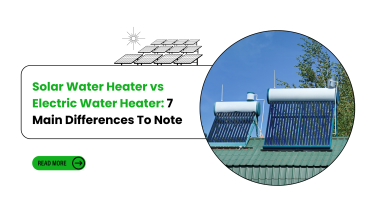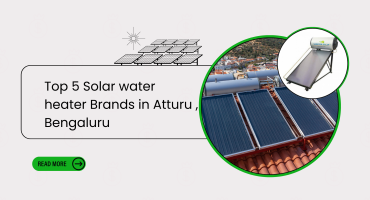
Varistor Solar is dedicated to empowering individuals, businesses, and communities with the transformative power of solar energy. We believe in a brighter, cleaner future and are committed to making sustainable living accessible to everyone.
+91-9113690456
Email: sales@varistorsolar.com
Varistor Solar
NO 40/C, KALKERE VILLAGE,12TH MAIN, NRI LAYOUT,Ramamurthy Nagar, Bangalore North,Bangalore- Karnataka, 560016
In today's world, hospitals are one of the largest consumers of energy, especially when it comes to heating water for patient care, sanitation, and other healthcare-related needs. In this Hospital Case Study With rising energy costs and an increasing focus on sustainability, many hospitals are turning to renewable energy sources, such as solar water heaters, to cut down on their electricity bills and reduce their carbon footprint.

In this case study, we’ll explore how a hospital in India successfully saved big by installing solar water heaters in Hospital Case Study. We'll delve into the specifics of how the system was set up, the challenges faced, the savings achieved, and the environmental impact of making the switch to solar energy.
Background: The Need for Energy Efficiency in Hospitals
Hospitals are high-energy facilities. With a continuous demand for hot water, especially in departments like surgery, maternity, and sanitation, the energy bills can quickly spiral out of control. This was the case for Sanskriti Hospital, a leading healthcare provider located in Bengaluru, India. Despite efforts to minimize energy consumption, the hospital’s water heating costs were becoming a significant portion of its monthly utility bills.
To address this challenge, the hospital management decided to explore renewable energy options and chose to install solar water heaters as part of their sustainability initiative.
Solar Water Heater Installation at Sanskriti Hospital
Initial Challenges
- High Energy Costs: The hospital was spending over ₹1.5 lakh per month on electricity bills, a significant portion of which was spent on water heating.
- Dependence on Grid Power: Most of the hot water needs were met using electricity-powered water heaters, which were costly to operate and contributed to the hospital’s carbon emissions.
- Environmental Concerns: The hospital’s leadership team wanted to reduce its environmental footprint and contribute to India's renewable energy goals.
Solution: Installation of Solar Water Heating System
Sanskriti Hospital partnered with Varistor Solar, a leading solar solution provider in Bengaluru, to install a rooftop solar water heating system. The goal was to reduce dependence on grid power and harness the abundant sunlight in Bengaluru for water heating needs.
Solar Water Heater System Design
The solar water heater system at Sanskriti Hospital included:
- Solar Collectors (Panels): 30 high-efficiency solar collectors installed on the hospital’s rooftop.
- Storage Tank: A 5000-litre insulated storage tank to store the heated water.
- Pump and Circulation System: A pump-based system to circulate the water between the solar collectors and the storage tank.
- Piping and Plumbing: A network of insulated pipes to transfer hot water to various departments.
The system was designed to meet around 80% of the hospital’s total water heating requirements.
Cost Analysis: Savings Achieved
Installation Costs
- Total Installation Cost: ₹12,00,000
- Expected Payback Period: 5 years
- Government Subsidy: The hospital received a 30% subsidy under India’s National Solar Mission, reducing the upfront installation cost.
Monthly Energy Savings
Prior to the installation of the solar water heater, the hospital was spending approximately ₹1.5 lakh per month on electricity for water heating. After the system was installed, the hospital's monthly expenditure on electricity dropped to around ₹50,000, resulting in monthly savings of ₹1 lakh.
| Category | Before Solar Heater | After Solar Heater | Savings |
| Electricity Bill (Monthly) | ₹1,50,000 | ₹50,000 | ₹1,00,000 |
| Water Heating Energy Cost | ₹1,00,000 | ₹20,000 | ₹80,000 |
| Other Energy Costs | ₹50,000 | ₹30,000 | ₹20,000 |
Yearly Savings
Based on the monthly savings of ₹1 lakh, the hospital is now saving ₹12 lakh annually on energy costs.
| Parameter | Amount (INR) |
| Annual Savings | ₹12,00,000 |
| Total Investment | ₹12,00,000 |
| Payback Period | 1 Year (after subsidy) |
The solar water heater system paid for itself in less than one year, considering the government subsidy. Even without the subsidy, the payback period would have been approximately 5 years.
Environmental Impact
In addition to the significant cost savings, the installation of solar water heaters also had a positive impact on the hospital’s environmental footprint. By switching to solar energy, the hospital was able to significantly reduce its reliance on fossil fuels.
Carbon Footprint Reduction
Before the installation, the hospital was emitting approximately 1.2 tons of CO2 per month due to electricity usage for water heating. After switching to solar water heaters, the hospital has reduced its CO2 emissions by 80%, avoiding nearly 12 tons of CO2 annually.
| Parameter | Before Solar Heater | After Solar Heater | Reduction |
| CO2 Emissions (per year) | 12 tons | 2.4 tons | 9.6 tons |
| Annual Energy Savings | ₹12,00,000 | ₹0 | ₹12,00,000 |
Long-Term Environmental Benefits
The environmental benefits of installing solar water heaters go far beyond the immediate reduction in carbon emissions. Over a 20-year lifespan of the solar water heating system, the hospital is expected to save:
- 240 tons of CO2 emissions
- 480,000 kWh of electricity
- Significant reductions in water pollution due to less dependence on coal and gas-powered electricity generation.
Conclusion: The Power of Solar Energy in Healthcare
The case of Sanskriti Hospital in Bengaluru is a prime example of how hospitals can leverage solar energy to cut down on energy costs, reduce their environmental impact, and make their operations more sustainable.
By installing a solar water heating system, the hospital not only saved ₹12 lakh annually but also made a significant contribution to reducing its carbon footprint. The payback period of just one year (with the government subsidy) and the long-term savings make solar water heaters a viable and cost-effective solution for healthcare facilities across India.
Key Takeaways:
- Solar Water Heaters are a cost-effective solution for hospitals, offering significant savings on energy bills.
- Government Subsidies can drastically reduce installation costs and improve the return on investment.
- Hospitals can reduce their carbon footprint significantly by switching to renewable energy sources.
- The payback period for solar water heaters is relatively short, especially with subsidies.
For hospitals looking to follow in the footsteps of Sanskriti Hospital, it's crucial to partner with trusted solar solution providers like Varistor Solar, who can offer expertise in design, installation, and maintenance of solar water heating systems.
Looking to save big with solar energy? Contact Varistor Solar today to discuss your hospital's needs and take the first step toward a sustainable future!
FREQUENTLY ASKED QUESTIONS
Now It's Your Turn:
Making the switch to solar water heaters in India is a smart and sustainable choice. The top brands like Varistor Solar™, Racold, Havells, V-Guard, and AO Smith offer reliable options to meet your hot water needs efficiently.
Among these, Varistor Solar™ stands out as the top choice in India, trusted by many. We provide a variety of solar water heaters, catering to different preferences and requirements. Our clients trust us for our quality and performance.
For more details about our solar water heaters, call us at 9113690456 or email sales@varistorsolar.com. Choose Varistor Solar™ for a greener and more energy-efficient future.
"WHAT YOU CAN READ NEXT"








